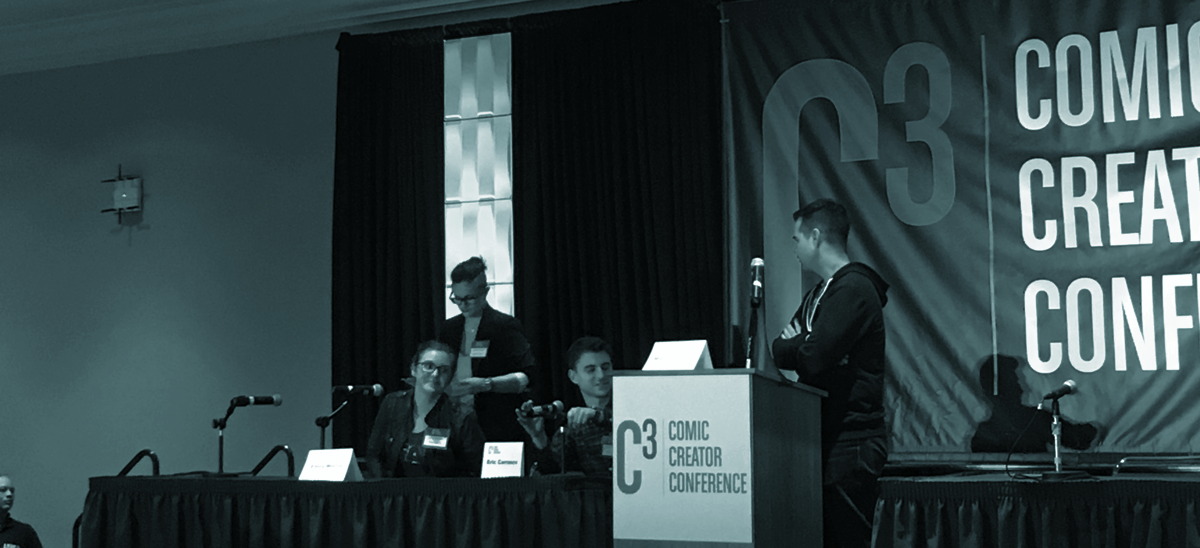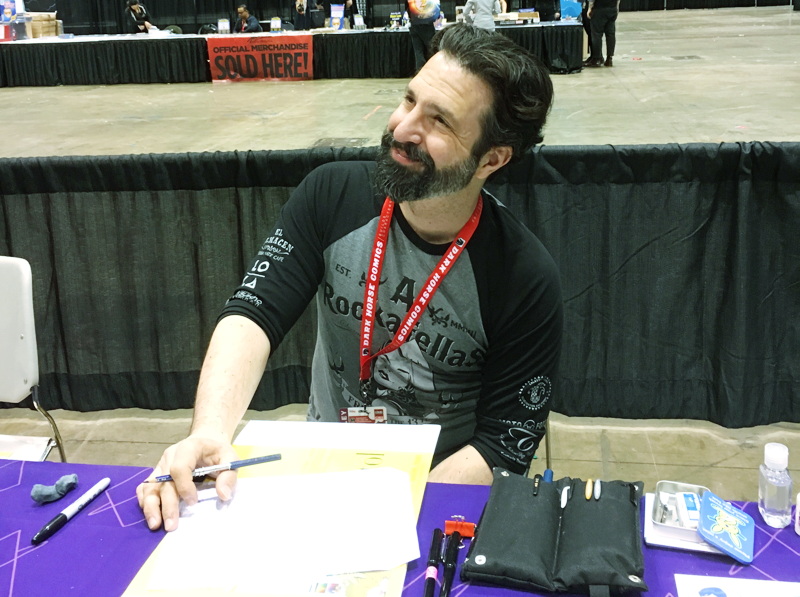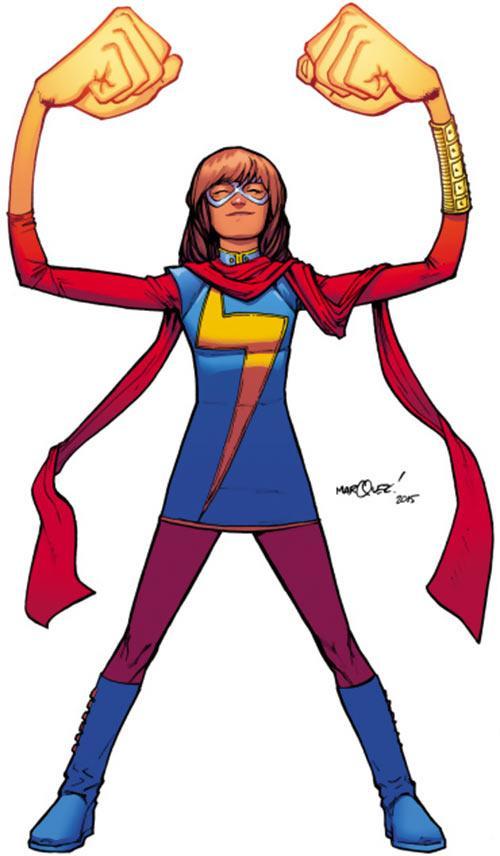by David Seidman
[Conventions are coming fast and furious and if you’re involved in comics at all you’ll probably be either moderating, appearing on or sitting in the audience of one soon. Here’s some tips on making them more interesting for all from an industry veteran.]
A lot of comic-con panels offer only a few gems of real interest surrounded by endless fog of boring chatter.
I’ve been to hundreds of comics convention panel discussions as a comics editor, publicist, journalist, and fan. Below, I’ve assembled some tips making a panel interesting for everyone, whether you’re a member of the audience, a panelist, or a moderator.
Notes for everyone:
- Arrive early. Coming in late, walking around the room and finding a seat distracts everyone else from what a panelist is saying.
- Keep questions and comments short. Time runs out fast during a panel discussion.
- Avoid trivia. At a trade show for comics retailers, I attended an hour-long panel about the then-new Free Comic Book Day. A lot of retailers had questions about whether and how to implement it. But nearly 20 percent of the time went to waste in debating (and I’m not making this up) whether the FCBD store banner should have red highlights or purple ones.
Audience members:
- Turn off your phone and put it away. Otherwise, it’ll distract you and everyone else.
- If you want to talk with another audience member, go outside. Chatting while panelists are talking is rude.
- If you want to ask the panelists a question, sit up front and wear an eye-catching color; bright red works well. The panel may have time for only a few questions, so prep yours before the moderator asks for them, and raise your hand (or get in line) as soon as the moderator opens the floor.
- When you speak to the panelists, ask a question. Don’t throw out a comment, an opinion, or even a compliment to the panelists unless you follow it up with a question — for instance, “I think movies based on comics give too much credit to the original writers and artists. What do you think?”
- Don’t talk about yourself. This tip comes from my colleague Shane Snoke. The audience is there to hear about the panelists and their work, not about you.
- Don’t delay the panelists’ leaving the room after the panel. The convention probably needs the room for the next event, and the panelists may have some place to go. If you want to talk with a panelist after the panel, don’t block the panelist from leaving the room.
Panelists:
- Go to the bathroom before the panel. You can probably hold your water for the length of the panel discussion, but audience members may want to talk to you afterwards, and you may embarrass yourself and annoy them if you say, “I’d love to talk to you, but can you wait for like ten or fifteen minutes while I hunt for a bathroom and, y’know, use it?” Emptying yourself out beforehand can prevent this problem.
- Bring a bottle of water. Talking can be thirsty work, and the convention may not supply water. But sip rather than guzzle, lest you run into the bathroom problem again.
- Answer questions with anecdotes. For instance: if the moderator asks how you create a story, you could talk about some vague generality like inspiration vs. perspiration; but the audience will get more out of the experience if you pick a specific story that you’ve created and tell what inspired it.
- When you aren’t talking, look at the person who is. I’ve seen a panelist answer a question while other panelists whisper, giggle, or pass notes to each other. The audience notices, and the panelist who’s talking feels that no one’s paying attention. Ignoring the speaker is rude and embarrassing.
- Listen closely when people ask you questions. When a moderator or audience member asks a question, sometimes a panelist will annoy or confuse the audience by giving an answer that doesn’t quite match the question. If you’re not sure about the question, ask the questioner or repeat or clarify it.
Moderators:
- If you choose the panelists, look for contrasts. Assembling five straight, white, middle-aged guys who generally agree with each other can produce a dull panel. Mixing panelists of different races, genders, orientations, ages, and viewpoints can make things interesting.
- Prepare for the event. Veteran moderator Tony Panaccio says, “I always liked to have a little chat with each panelist ahead of time to get their thoughts on the topic of the panel. That way, you can help get the top comments from each panelist even if [you’re] just winging it.”
- Don’t wing it. Write out questions ahead of time. You don’t have to use them, but keeping them handy will keep you from fumfering around in search of things to ask.
- Bring a pen and note pad to jot down questions about things that the panelists say.
- Ask the convention organizers for markers, an easel, and a large sketch pad — at least 20 inches by 30. If a panelist mentions something visual, ask him or her to sketch it on the pad. This action wakes up audience members and holds their attention. (The markers should be thick-tipped and dark so the audience can easily see what the panelist is sketching.)
- Get rid of tables if you can. The typical convention panel is a line of panelists behind a table, sometimes up on a dais. This format separates the panelists from the audience. Removing it makes the venue feel more personal — less like a lecture hall and more like a living room.
- Ask audience members at the room’s back and sides to come closer to front and center. Audience members tend to scatter throughout the room, which dissipates their energy and interest. Bringing them closer nudges them to pay more attention to the panel.
- Ask the panelists how-and-why questions rather than yes-or-no questions. You’ll get more interesting answers.
- Draw out panelists who don’t talk much. Often, they have intriguing things to say but clam up in the presence of more extroverted panelists.
- Watch the panelists. If they do anything interesting, ask about it. For instance: “Joan, when I mentioned Stan Lee, you grimaced. Do you have a Stan Lee story?”
- Watch the time, too. The convention may not warn you that you’ve got only a few minutes left. You could find yourself cutting off an interesting anecdote because you didn’t realize that the panel’s gone on too long.
Have fun, everyone!
David Seidman has worked in comics for Disney NBM, Papercutz, Marvel, and other companies. You can read more from him at his website.









I’ve attended shows with panels, and I have also been ON panels.
When I am asking a question of a panelist, I try to phrase it so that it will allow the panelist to give an answer that informs us ALL. This is a rare opportunity to ask something that no one else is asking, so Make the most of it! (NOT: what is it like to work with (fill in actor’s name here)
The moderator is the key to keeping these panels moving along, and needs to stay involved in the discussion. I’ve seen many instances of an audience member tying things up with a long rambling story about themselves, or a panel member who repeats himself several times.and wanders off topic. Time for the moderator to jump in and put the train back on track!!
We all want a fun and informative panel, with a sharp and smooth moderator. And yes, put those addictive phones away while you are moderating or on a panel.
As a moderator and participant in may a panel, when I’m modding, I try to prime the pump a little. “Soanso is known for her great layouts – is that part of why you wanted to work with her?”
You will quickly know who is going to be able to blab endlessly on the panel and who needs to be prompted a bit. Those who need some prompting generally want a question to guide them, not some open ended nebulous question.
That said, I know I tend to get lost in the weeds on my questions sometimes. I have done so many manels that I just write down key topics that I want to cover, but that sometimes leads to wandering questinoitis. Something I should work on.
As somebody who attends a lot of panels, what makes me choose one panel over another to attend is am I going to learn something on this panel?
If the only purpose of the panel is to pitch me a product, then I’m less interested in going. I can get that info in Previews or on a website.
I get that creators & companies do panels to pitch their latest thing, but I’d like to learn something I hadn’t heard before. It about something about the creators career, a ‘secret origin’ or sorts about something, etc.. just so I don’t feel like I spent the last hour hearing nothing but an elaborate pitch.
Comments are closed.